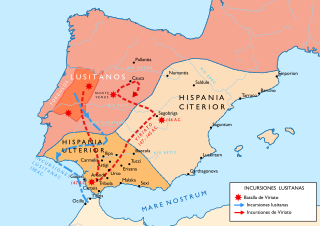Related Research Articles
This article concerns the period 139 BC – 130 BC.
Lucius Licinius Lucullus was a Roman politician who became consul in 151 BC.

Lucius Licinius Lucullus was a Roman general and statesman, closely connected with Lucius Cornelius Sulla. In culmination of over 20 years of almost continuous military and government service, he conquered the eastern kingdoms in the course of the Third Mithridatic War, exhibiting extraordinary generalship in diverse situations, most famously during the Siege of Cyzicus in 73–72 BC, and at the Battle of Tigranocerta in Armenian Arzanene in 69 BC. His command style received unusually favourable attention from ancient military experts, and his campaigns appear to have been studied as examples of skilful generalship.

Viriathus was the most important leader of the Lusitanian people that resisted Roman expansion into the regions of western Hispania or western Iberia, where the Roman province of Lusitania would be finally established after the conquest.
This is a historical timeline of Portugal.
Servius Sulpicius Galba was a consul of Rome in 144 BC.

The Roman Republic conquered and occupied territories in the Iberian Peninsula that were previously under the control of native Celtic, Iberian, Celtiberian and Aquitanian tribes and the Carthaginian Empire. The Carthaginian territories in the south and east of the peninsula were conquered in 206 BC during the Second Punic War. Control was gradually extended over most of the peninsula without annexations. It was completed after the end of the Roman Republic, by Augustus, the first Roman emperor, who annexed the whole of the peninsula to the Roman Empire in 19 BC.

The Numantine War was the last conflict of the Celtiberian Wars fought by the Romans to subdue those people along the Ebro. It was a twenty-year conflict between the Celtiberian tribes of Hispania Citerior and the Roman government. It began in 154 BC as a revolt of the Celtiberians of Numantia on the Douro. The first phase of the war ended in 151, but in 143, war flared up again with a new insurrection in Numantia.
The Second Celtiberian War was one of the three major rebellions by the Celtiberians against the presence of the Romans in Hispania.
The First Celtiberian War and Second Celtiberian War were two of the three major rebellions by the Celtiberians against the presence of the Romans in Hispania.

The Lusitanian War, called Pyrinos Polemos in Greek, was a war of resistance fought by the Lusitanian tribes of Hispania Ulterior against the advancing legions of the Roman Republic from 155 to 139 BC. The Lusitanians revolted in 155 BC, and again in 146 BC and were pacified. In 154 BC, a long war in Hispania Citerior, known as the Numantine War, was begun by the Celtiberians. It lasted until 133 and is an important event in the integration of what would become Portugal into the Roman and Latin-speaking world.

Audax, Ditalcus and Minurus were Turdetanian warriors who participated in the Lusitanian War. They were the supposed betrayers and assassins of the Lusitanian leader Viriathus.
This section of the timeline of Hispania concerns Spanish and Portuguese history events from the Carthaginian conquests to before the barbarian invasions.
Marcus Aurelius Cotta was a Roman politician and general who was consul in 74 BC. He was posted to Bithynia with a Roman fleet as part of the Third Mithridatic War. He was defeated by King Mithridates VI of Pontus. Rescued by his fellow consul, he reduced the Pontic coast and captured the city of Heraclea after a two-year siege. Returning to Rome in 70 BC, Cotta was acclaimed for his victory. However, around 67 BC he was convicted of the misappropriation of war booty and expelled from the Senate, a signal mark of disgrace.
Quintus Fabius Maximus Servilianus was the adoptive son of Quintus Fabius Maximus Aemilianus and the natural son of Gnaeus Servilius Caepio --hence the adoptive cognomen Servilianus. He was consul of the Roman Republic in 142 BC together with Lucius Caecilius Metellus Calvus. He was the brother of Gnaeus Servilius Caepio and Quintus Servilius Caepio. All three brothers were commanders in the Roman Province of Hispania Ulterior and fought in the Lusitanian War.
Curius and Apuleius were chieftains of the Lusitanians, a proto-Celtic tribe from western Hispania. They were active at the last phase of the Lusitanian War.
Gaius Valerius Triarius was a First Century BC Roman politician and general, a member of the gens Valeria. During the Third Mithridatic War he served as a legate to Lucius Licinius Lucullus, the Roman commander in charge of the war effort against king Mithridates VI of Pontus. He played a pivotal role in the capture of Heraclea Pontica, but was later defeated by Mithridates at the Battle of Zela in 67 BC.
The gens Vetilia, also written Vecilia, was a minor plebeian family at Rome. Members of this gens never attained much importance in the Roman state.
The Raid of Carpetania was a military conflict between the Lusitanians and the Roman Republic.
References
- 1 2 ”Viriathus rose from lowly shepherd stock to a military career which saw him defeat five Roman generals, including Gaius Plautius, Claudius Unimanus and Gaius Negidius. So successful was he that the Celtiberians were tempted back onto the battlefield in 143 BC to join him. In 147 BC, 10,000 Lusitanians who had survived the atrocities committed by Lucullus and Galba rose up, only to find themselves ensnared in a trap by Marcus Vetilius with a similar number of men. The Lusitanians had no option but to surrender, that is until Viriathus reminded them of the perfidious, murderous Galba and Lucullus. Taking 1,000 men, Viriathus distracted the Romans, allowing the rest of the Lusitanians to escape with orders to rendezvous at Tribola. He then ambushed Vetilius, killing 4,000 of the Romans.” in Chrystal, 2015
- 1 2 3 Alexandria 1912–1913, p. 237.
- Alexandria, Appianus (1912–1913). Appian's Roman history. Vol. 1. Harvard University Press.
- Chrystal, Paul (2015). Roman Military Disasters: Dark Days & Lost Legions. Paul Chrystal. ISBN 9781473873957.